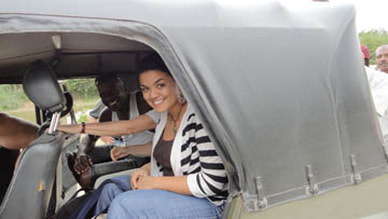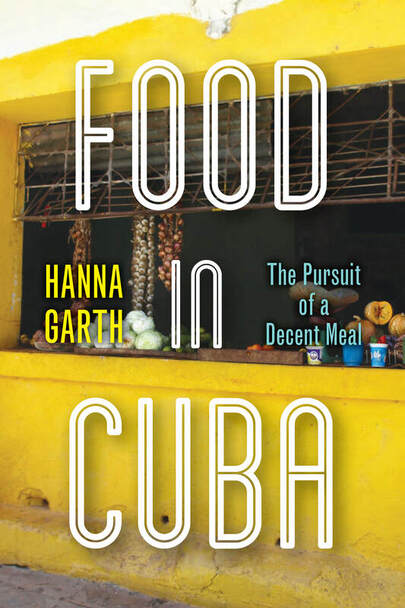About Me

As a sociocultural and medical anthropologist I am most broadly interested in the ways in which people struggle to overcome structural violence. My recent work is focused on the connections between food systems, structural inequalities, health, and wellbeing. This work has looked at the ways in which macro-level changes and shifts in local food distribution systems impact communities, families, and individuals. I have studied how food scarcity and reduced access to affordable food influence individual distress, and household and community dynamics. I have also studied the ways in which food justice organizations attempt to improve access to healthy food for low income communities.
All of my research, teaching, and mentoring is designed around my commitment to feminist methodologies and critical race theory. My regional interests include Latin America and the Caribbean, as well as Latinx and Black communities in the United States. In addition to my work in Cuba I have an ongoing project in Los Angeles, CA.
I am currently an assistant professor in the Department of Anthropology at Princeton University. Previously I worked in the Department of Anthropology at the University of California, San Diego (2016-2021). I completed my BA with a triple major in Anthropology, Hispanic Studies, and Policy Studies at Rice University, an MPH in Global Health at Boston University, and a PhD in Anthropology at UCLA. I held a University of California President's Postdoctoral Fellowship at the University of California, Irvine from 2015-2016.
All of my research, teaching, and mentoring is designed around my commitment to feminist methodologies and critical race theory. My regional interests include Latin America and the Caribbean, as well as Latinx and Black communities in the United States. In addition to my work in Cuba I have an ongoing project in Los Angeles, CA.
I am currently an assistant professor in the Department of Anthropology at Princeton University. Previously I worked in the Department of Anthropology at the University of California, San Diego (2016-2021). I completed my BA with a triple major in Anthropology, Hispanic Studies, and Policy Studies at Rice University, an MPH in Global Health at Boston University, and a PhD in Anthropology at UCLA. I held a University of California President's Postdoctoral Fellowship at the University of California, Irvine from 2015-2016.
Research Projects
Santiago de Cuba: Household Food Consumption
|
From 2008 to 2019 I conducted an ethnographic research project in Santiago de Cuba, the island's second largest city. This research reveals how contemporary changes in Cuban consumption practices contribute to increasing levels of stress as individuals and families face difficulty in accessing their preferred foods. Since the early 1990s, the goods and services equitably distributed by the state since Cuba’s 1959 socialist revolution have slowly become the responsibility of individuals. I analyze how families respond to changes in the food system and struggle to maintain a decent quality of life as the Cuban socialist welfare state falters in the post-Soviet era. Based on 16 months of ethnographic work in Santiago de Cuba, a majority Black city, I demonstrate how households struggle to acquire food and assemble a “decent” meal, a morally laden local social category wherein families determine whether food quality and cultural-appropriateness meet their own standards. Drawing upon my in-depth observations and interviews, I introduce the framework of “the politics of adequacy,” which details how people resist and make sense of scarcity or changing availability of basic life necessities. My work demonstrates a need to understand people’s practices of acquisition, and illuminates the ways in which the politics of adequacy may exacerbate or introduce new vulnerabilities as resources become scarce.
|
Los Angeles: Food Justice Organizations
|
I am currently writing a book on the Los Angeles Food Justice Movement, tentatively titled: Serving the Other: Race, Abolition, and Justice in the Food Movement (under contract). This book is based on research conducted between 2008 and 2020 on several Los Angeles non-profit, city, or county-based food justice organizations that were part of a growing social movement to improve access to healthy food among low income communities. The project focused on organizations that intervene in South and East Los Angeles, predominantly in Black and Latinx areas. As a part of this study, I analyze the ways in which these organizations understand and deal with the complicated issues related to inequality, racism, and other forms of discrimination that the communities face. Overall I track the momentum around the food justice movement and the ways in which organizations build local support around their projects. I document the strategies that leaders use to achieve their goals of increasing food equity.
|
South Los Angeles: Household Food Access and Basic Needs after COVID-19
Beginning in Fall 2021 I am starting a new research project on household food access and basic needs after COVID-19 within households in South Los Angeles. The disproportionate impact of the COVID-19 pandemic on the health and economic wellbeing of the South LA community has shifted the kinds of struggles that area households face. Community organizations developed rapid emergency interventions to address immediate needs for secure housing and sufficient food and water. As the community recovers from the pandemic and their household needs shift, they will draw on community resources, kinship networks, and friends in new and diverse ways. This research seeks to understand how South LA residents navigate area infrastructures and community organizations in order to facilitate access to basic needs and enable survival. This work is in collaboration with Community Services Unlimited, Inc (CSU, Inc) and the Paul Robeson Community Wellness Center.
Resources/Information:
Free Food Distributions in South LA -- Comida Gratuita en el SurCentro de Los Angeles
Resources/Information:
Free Food Distributions in South LA -- Comida Gratuita en el SurCentro de Los Angeles
Multi-Sited Caribbean Fish and Seafood Project
Beginning in Winter 2021 I am starting new exploratory work on fish and seafood consumption in the Caribbean. This project will include studying local, small scale artisan fisher people and the ways in which climate change has impacted local marine resources.
The Heirloom Gardens Project
The Heirloom Gardens Oral History Project is a collaboration of Princeton University, Spelman College, and the Ujamaa Cooperative Farming Alliance to collect oral histories of people who have worked to preserve Black and Indigenous seed and foodways through the Southeastern United States and Appalachia. Working across six sites over two years, students and faculty will work with communities to interview and archive the stories of farmers, gardeners, chefs, community organizers, local historians and others who have been actively sustaining rich farming, culinary, and medicinal traditions. I serve as a co-PI on this project. Read more here: https://heirloomgardens.princeton.edu/
Teaching
Undergraduate Courses Taught:
Gender & the Household (Princeton)
#BlackLivesMatter (Princeton, UCSD)
Race and Racisms (UCSD)
The Anthropology of Food (UCLA)
Food, Culture & Society (Princeton, UCSD)
Latin American and Caribbean Anthropology (UCLA)
Graduate Courses Taught:
Gender & the Household (Princeton)
Postcolonial and Decolonial Theory (UCSD)
Theories of Social Justice (UCSD)
Anthropological Perspectives on the Human Body (UCLA)
Gender & the Household (Princeton)
#BlackLivesMatter (Princeton, UCSD)
Race and Racisms (UCSD)
The Anthropology of Food (UCLA)
Food, Culture & Society (Princeton, UCSD)
Latin American and Caribbean Anthropology (UCLA)
Graduate Courses Taught:
Gender & the Household (Princeton)
Postcolonial and Decolonial Theory (UCSD)
Theories of Social Justice (UCSD)
Anthropological Perspectives on the Human Body (UCLA)

